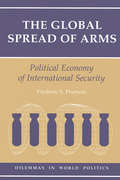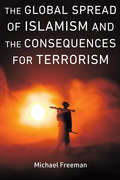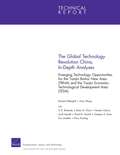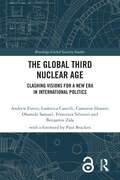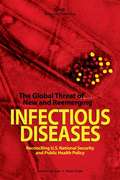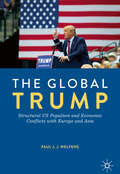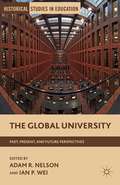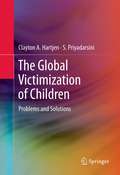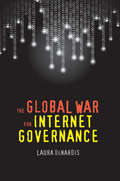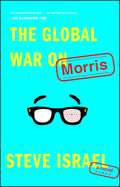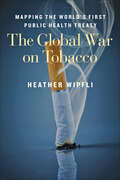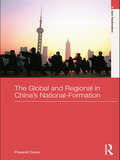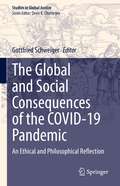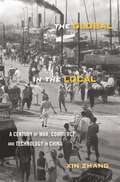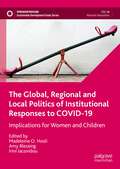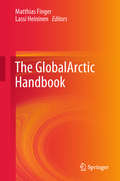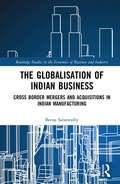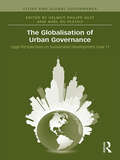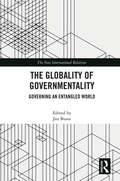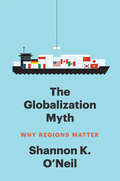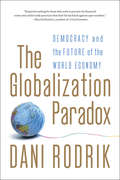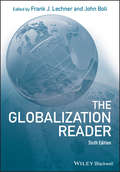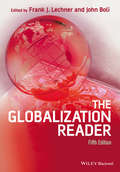- Table View
- List View
The Global Spread Of Arms: Political Economy Of International Security (Dilemmas In World Politics Ser.)
by Frederic S PearsonDespite the end of the Cold War, more countries are obtaining more sophisticated weapons from more suppliers than ever before. This is partly due to the growing number of regional and inter-ethnic conflicts around the world, but it also reflects the political and economic difficulties of weaning public and private enterprise away from the highly lucrative defence industry. Charting the history of the arms dilemma and providing an assessment of the myths and recent trends in weapons development internationally, this book describes the twin motives of welfare and security in the arms market - who buys weapons, who sells them, where they are produced, and how they are (or are not) used.
The Global Spread of Islamism and the Consequences for Terrorism
by Michael Freeman Katherine Ellena Amina Kator-MubarezTerrorism motivated by Islamist religious ideology has been on the rise for the last forty years. Why? The three prior waves of terrorism—anarchist, nationalist, and Marxist—arose generally from a combination of geopolitical events and local grievances. This &“fourth wave&” of terrorism, however, has risen out of a different set of conditions. Existing analyses of terrorism often consider how terrorist ideologies have evolved or how grievances have changed over time. But these approaches miss what could be called the &“supply&” side of ideology—how state and nonstate actors have exported an ideology of Islamism and how this ideology has taken root beyond what grievances or ideological interpretations would predict. Michael Freeman connect the dots between several key events in 1979—the hostage crisis at the Grand Mosque in Mecca, the Iranian Revolution, and the Soviet incursion into Afghanistan—and the incentives these events created for different actors to spread the supply of Islamism, the institutions they produced in various countries, and the terrorists who emerge from these institutions. In The Global Spread of Islamism and the Consequences for Terrorism Freeman examines four countries that have experienced this export of Islamism—Indonesia, Pakistan, the United Kingdom, and the United States—and briefly describes similar patterns in other countries. Understanding the importance of the supply side of Islamism helps us better understand the strength and staying power of this current wave of terrorism as well as opportunities to better counter it.
The Global Technology Revolution China, In-Depth Analyses
by Anny Wong Richard SilberglittChina's Tianjin Binhai New Area and the Tianjin Economic-Technological Development Area commissioned a technology-foresight study to help them plan for economic growth. The authors recommend seven emerging technology applications (TAs)--solar energy, mobile communications, rapid bioassays, new water-purification systems, molecular-scale drugs, electric and hybrid vehicles, and green manufacturing--and describe drivers, barriers, and plans for each.
The Global Third Nuclear Age: Clashing Visions for a New Era in International Politics (Routledge Global Security Studies)
by Andrew Futter Ludovica Castelli Cameron Hunter Olamide Samuel Francesca Silvestri Benjamin ZalaThis book provides an in-depth examination of the technological, geopolitical and normative pressures driving the world into a new, more complex and potentially more dangerous Third Nuclear Age.By adopting an innovative framework for analysis, the book challenges the constrained focus of much of the existing literature by explaining that the pathways to nuclear security for different actors across the globe will vary considerably in this new context. It argues that the Third Nuclear Age will be defined by friction and conflict between “Nuclear Traditionalists,” “Technological Transformers,” “Hedgers and Balancers,” and “Activists and Protestors,” as different interests and visions of the nuclear future clash. The book draws on dozens of interviews and non-English language sources to provide a global approach and looks at the security politics driving the political debate in 20 different countries across the globe.This book will be of much interest to students of nuclear politics, security studies and International Relations.The Open Access version of this book, available at www.taylorfrancis.com, has been made available under a Creative Commons Attribution-Non Commercial-No Derivatives (CC-BY-NC-ND) 4.0 license.
The Global Threat of New and Reemerging Infectious Diseases
by Peter Chalk Jennifer BrowerThis study offers a more comprehensive analysis of the security implications of the spread of infectious diseases than has been done to date. The study examines the impact of the HIV/AIDS epidemic in South Africa, highlighting this particular crisis as a graphic example of the devastating effects that infectious disease can have on virtually every aspect of a state's functioning viability. It also makes a detailed analysis of the United States, delineating the threat posed by specific diseases; assessing the effectiveness of the existing public health infrastructure; and offering specific actions that can be taken to improve the country's ability to meet this emerging challenge. ISBN: 0-8330-3293-3 Price: $20.00 Est. page count: last roman--xvii
The Global Transformation
by Barry Buzan George LawsonThe 'long nineteenth century' (1776-1914) was a period of political, economic, military and cultural revolutions that re-forged both domestic and international societies. Neither existing international histories nor international relations texts sufficiently register the scale and impact of this 'global transformation', yet it is the consequences of these multiple revolutions that provide the material and ideational foundations of modern international relations. Global modernity reconstituted the mode of power that underpinned international order and opened a power gap between those who harnessed the revolutions of modernity and those who were denied access to them. This gap dominated international relations for two centuries and is only now being closed. By taking the global transformation as the starting point for international relations, this book repositions the roots of the discipline and establishes a new way of both understanding and teaching the relationship between world history and international relations.
The Global Transformation of Time: 1870-1950
by Vanessa OgleAs railways, steamships, and telegraph communications brought distant places into unprecedented proximity, previously minor discrepancies in local time-telling became a global problem. Vanessa Ogle's chronicle of the struggle to standardize clock times and calendars from 1870 to 1950 highlights the many hurdles that proponents of uniformity faced.
The Global Trump: Structural US Populism and Economic Conflicts with Europe and Asia
by Paul J.J. Welfens"This book is able to explain and analyze what has eluded both scholars and thought leaders in business and the media - how and why populism has grabbed center stage. Highly recommendable."-David B. Audretsch, Indiana University Bloomington, USA "Welfens provides valuable insight into US politics and describes the strategic options for Europe going forward."-Barry Eichengreen, University of California, Berkeley, USA "With great skill Welfens traces the implications of US populism for the global economic system."- Jeffrey D. Sachs, Columbia University, USA "This critique of Trump´s fiscal and international trade policies and their weak intellectual basis deserves the attention of US and European readers alike"-Richard H. Tilly, University of Münster, Germany What lies behind the Trump victory of 2016 and the US' new raft of economic policies? Is a populist presidency in the United States likely to be a temporary phenomenon or a structural long-term challenge? In an era of declining multilateralism, what can the US still stand to learn from Europe, where several countries have effective lifetime economic welfare equal to that of the US - and what can the EU learn from the US in return? Furthermore, what international economic dynamics can be expected from the Sino-US trade conflict and can globalization be maintained? In this timely volume, Paul Welfens provides a rare, clear-sighted and scholarly analysis of the global problems created by Trump's protectionism and economic policy. He leverages his understanding of these problems to make concrete policy suggestions that could help prevent the world economy from falling back into a variant of the Great Powers regime of the late nineteenth century.
The Global University
by Ian P. Wei Adam R. NelsonEngages a topic of pressing concern for government, business, and education leaders around the world: the race to establish 'world-class' universities. Some herald the globalization of higher education as the key to a dynamic and productive 'knowledge society. ' Others worry that modern universities have come to resemble multinational corporations.
The Global Victimization of Children
by Clayton A. Hartjen S. PriyadarsiniThis book describes the concept of child victimization in all its facets. Millions of young people throughout the world face violence, sexual, physical, and emotional abuse and exploitation on a daily basis. The worldwide victimization of young people can be prevented, or, at least, its incidence can be greatly reduced, if purposeful action is taken to do so. This volume researches and documents some of the ways in which young people throughout the world are victimized, and suggests strategies for preventing various forms of child vistimization. Eight distinct forms of victimization are identified and analyzed in detail. Included are discussions on child prostitution and pornography, economic exploitation through child labor and trafficking, physical and other abuse inflicted on young people in schools and other institutions, the use of children as armed combatants, and the denial of the basic needs and rights of children to such things as home and to education. In each chapter the authors discuss the nature of the victimization, its global dimensions and prevalence, and the measures governments and/or others are taking, or failing to take, to combat the harm based on the concept that youth victimization is a form of government crime.
The Global War for Internet Governance
by Laura DenardisThe Internet has transformed the manner in which information is exchanged and business is conducted, arguably more than any other communication development in the past century. Despite its wide reach and powerful global influence, it is a medium uncontrolled by any one centralized system, organization, or governing body, a reality that has given rise to all manner of free-speech issues and cybersecurity concerns. The conflicts surrounding Internet governance are the new spaces where political and economic power is unfolding in the twenty-first century. This all-important study by Laura DeNardis reveals the inner power structure already in place within the architectures and institutions of Internet governance. It provides a theoretical framework for Internet governance that takes into account the privatization of global power as well as the role of sovereign nations and international treaties. In addition, DeNardis explores what is at stake in open global controversies and stresses the responsibility of the public to actively engage in these debates, because Internet governance will ultimately determine Internet freedom.
The Global War on Morris: A Novel
by Steve IsraelA witty political satire ripped from the headlines and written by Congressman Steve Israel, who's met the characters, heard the conversations, and seen the plot twists firsthand.Meet Morris Feldstein, a pharmaceutical salesman living and working in western Long Island who loves the Mets, loves his wife Rona, and loves things just the way they are. He doesn't enjoy the news; he doesn't like to argue. Rona may want to change the world; Morris wants the world to leave him alone. Morris does not make waves. But one day Morris is seduced by a lonely, lovesick receptionist at one of the doctors' offices along his sales route, and in a moment of weakness charges a non-business expense to his company credit card. No big deal, you might think. Easy mistake. But the government's top-secret surveillance program, anchored by a giant, complex supercomputer known as NICK, thinks differently. Eventually NICK begins to thread together the largely disparate and tenuously connected strands of Morris's life--his friends, family, friends' friends, his traffic violations, his daughter's political leanings, his wife's new patients, and even his failed romantic endeavors--and Morris becomes the US government's new public enemy number one. A hilarious, debut novel from a charismatic author, The Global War on Morris toes the line between recent breaking headlines and a future that is not that difficult to imagine.
The Global War on Tobacco: Mapping the World's First Public Health Treaty
by Heather Wipfli“A major contribution not just to tobacco control research but also to research on global governance and public health . . . thorough [and] compelling.” —Frank J. Chaloupka IV, Institute for Health Research and Policy, University of Illinois–ChicagoAs the era of globalization progressed, the tobacco industry capitalized on its elements—including trade liberalization, foreign direct investment, and global communications—to expand into countries where effective tobacco control programs were not in place. As a consequence, tobacco became the leading cause of preventable death in the world, killing more people each year than HIV, malaria, and tuberculosis combined.In the mid-1990s, a committed group of public health professionals and institutions sought to challenge the tobacco industry’s expansion by negotiating a binding international law under the auspices of the World Health Organization. The WHO Framework Convention on Tobacco Control (FCTC)—the first collective global response to the causation of avoidable chronic disease—was one of the most quickly ratified treaties in United Nations history. In The Global War on Tobacco, Heather Wipfli tells the engaging story of the FCTC, from its start as an unlikely civil society proposal to its enactment in 178 countries as of June 2014. Wipfli also reveals how globalization offers anti-tobacco advocates significant cooperative opportunities to share knowledge and address cross-border public health problems.The book—the first to delve deeply into the origin and development of the FCTC—seeks to advance understanding of how non-state actors, transnational networks, and international institutionalization can impact global governance for health. Case studies from a variety of diverse high-, middle-, and low-income countries provide real-world examples of the success or failure of tobacco control. Written with public health professionals and students in mind, The Global War on Tobacco is a fascinating look at how international relations is changing to respond to the modern global marketplace and protect human health.
The Global and Regional in China's Nation-Formation (Asia's Transformations/Critical Asian Scholarship)
by Prasenjit DuaraChina’s history tends to be studied from a national perspective only. The Global and Regional in China’s Nation-Formation attempts to train our eyes to see the picture of China less as a self-contained entity, a "geobody", than as part of a broader set of global and regional processes; from the "outside-in". It covers the major historical problems of China in the twentieth century, namely imperialism, nationalism, state-building, religion and the role of history Part I views imperialism and nationalism in China from the perspective of global and regional circulations and interactions. It also examines the changing role of history over the twentieth century from the same perspective. Part II focuses on how myth, religion and Chinese conceptions of society and polity are re-shaped by external influences and forces, as well as how these internal practices themselves shape the external impact. Part III is a comparative section, examining how global processes become unique developments in China. The Global and Regional in China’s Nation-Formation is an ideal resource for anyone studying China’s history, society and culture.
The Global and Social Consequences of the COVID-19 Pandemic: An Ethical and Philosophical Reflection (Studies in Global Justice #1212)
by Gottfried SchweigerThis book directly addresses the social and economic consequences of the COVID-19 pandemic. It does so by focusing on both the immediate effects during the pandemic and the lockdowns, as well as the issues related to the long-term social consequences that are likely to result from the economic crisis in the coming years. To date, most philosophical essays and books have focused on the health aspects of the pandemic, and in particular on the fields of medical ethics and public health ethics. Containing a truly international and interdisciplinary group of scholars, a unique and global perspective is offered on the rarely discussed social and economic consequences of the pandemic. This book is of great interest to academic philosophers, but also to researchers from the social sciences.
The Global in the Local: A Century of War, Commerce, and Technology in China
by Xin ZhangThe story of globalization in the nineteenth and early twentieth centuries as experienced by ordinary people in the Chinese river town of Zhenjiang.Fear swept Zhenjiang as British soldiers gathered outside the city walls in the summer of 1842. Already suspicious of foreigners, locals had also heard of the suffering the British inflicted two months earlier, in Zhapu. A wave of suicides and mercy killings ensued: rather than leave their families to the invaders, hundreds of women killed themselves and their children or died at the hands of male family members. British observers decried an “Asian culture” of ritual suicide. In reality, the event was sui generis—a tragic result of colliding local and global forces in nineteenth-century China.Xin Zhang’s groundbreaking history examines the intense negotiations between local societies and global changes that created modern China. In the nineteenth and early twentieth centuries, world-historic political, economic, and technological developments transformed the textures of everyday life in places like Zhenjiang, a midsize river town in China’s prosperous Lower Yangzi region. Drawing on rare primary sources, including handwritten diaries and other personal writings, Zhang offers a ground-level view of globalization in the city. We see civilians coping with the traumatic international encounters of the Opium War; Zhenjiang brokers bankrolling Shanghai’s ascendance as a cosmopolitan commercial hub; and merchants shipping goods to market, for the first time, on steamships.Far from passive recipients, the Chinese leveraged, resisted, and made change for themselves. Indeed, The Global in the Local argues that globalization is inevitably refracted through local particularities.
The Global, Regional and Local Politics of Institutional Responses to COVID-19: Implications for Women and Children (Sustainable Development Goals Series)
by Madeleine O. Hosli Amy Blessing Irini IacovidouThe shift from response to recovery is now noticeable as the world moves past the paralyzing effects of the COVID-19 pandemic. This book explores responses to the pandemic by international, regional, and local institutions, multilateral action, and crisis prevention efforts at different levels of governance, with a specific focus on the situation of women and children. The contributions in this volume address novel topics and expand the analysis to the different challenges faced by women and children, linking these to the UN's Sustainable Development Goals, to create a holistic view of the true impact of the pandemic. The focus on international and regional cooperation provides further insights on how management of the COVID-19-induced crisis can be altered and improved. Immediate effects of the pandemic were focused on healthcare, but long-term and knock-on effects spread to different societal sectors and must be analyzed to ensure they will be addressed and, ultimately, resolved.
The GlobalArctic Handbook
by Matthias Finger Lassi HeininenThis book offers a systematic and comprehensive introduction to the Arctic in the era of globalization, or as it is referred to here, the ‘GlobalArctic’. It provides an overview of the current status of the Arctic as a result of global change, while also considering the changes in the Arctic that have a global effect. It positions the Arctic within a broad international context, it addresses four main themes are discussed: economics and resources; environment and earth system dynamics; peoples and cultures; and geopolitics and governance. Gathering together expert authors and building on long-term research activities, it serves as a valuable reference for future research endeavors.
The Globalisation of Indian Business: Cross border Mergers and Acquisitions in Indian Manufacturing (Routledge Studies in the Economics of Business and Industry)
by Beena SaraswathyConsolidation activities such as mergers and acquisitions (M&As) have been one of the major strategies adopted by Indian firms to withstand global competition. M&As experienced a substantial increase in value and volume during the post-liberalization era, facilitated by the presence of foreign subsidiaries in the Indian market as well as competitive pressure on domestic firms. The increased foreign investment through M&As brought new dimensions to the fore such as the implications on technological performance, efficiency, and more importantly, competition in the Indian market. The Globalisation of Indian Business: Cross Border Mergers and Acquisitions in Indian Manufacturing provides an in-depth analysis of these issues, specifically aiming to understand whether the M&As strategies helped the firms to achieve their desired objectives in terms of improvement in technology, efficiency and market power in the context of the increase of M&As in India, using appropriate statistical and econometric techniques. The book is of additional importance in the context of the recently implemented Competition Act, replacing the thirty year old MRTP Act in India. The new Act aims to maintain competition and protect consumers’ interests without harming that of the producers’. Based on the analysis, broadly, the study cautions the regulators to rethink the efficiency defence argument and become more vigilant on the creation of monopolies. On the other side, it suggests firms should reconsider their post-merger integration strategy since consolidation has not led to a sustainable increase in market share of the surviving firms.
The Globalisation of Urban Governance: Legal Perspectives On Sustainable Development Goal 11 (Cities and Global Governance)
by Helmut Philipp Aust Anél Du PlessisThe adoption of the Sustainable Development Goals (SDGs) by the UN General Assembly in 2015 represents the latest attempt by the international community to live up to the challenges of a planet that is out of control. Sustainable Development Goal 11 envisages inclusive, safe, resilient and sustainable cities around the world by the year 2030. This globally agreed vision is part of a trend in international policy toward good urban governance, and now awaits implementation. Fourteen original contributions collectively examine how this global vision has been developed on a conceptual level, how it plays out in various areas of (global) urban governance and how it is implemented in varying local contexts. The overarching hypothesis presented herein is that SDG 11 proves that local governance is recognised as an autonomous yet interrelated part of the global pursuit of sustainable development. The volume analyses three core questions: How have the normative ideals set forth in SDG 11 been developed? What are the meanings of the four sub-goals of SDG 11 and how do these relate to each other? What does SDG 11 imply for urban law and governance in the domestic context and how are local processes of urban governance internationalised? The Globalisation of Urban Governance makes an important scholarly contribution by linking the narrative on globalisation of good urban governance in various social sciences with legal discourse. It considers global governance and connects the existing debate about cities and their place in global governance with some of the most pertinent questions that lawyers face today.
The Globality of Governmentality: Governing an Entangled World (New International Relations)
by Jan BusseThis book reinvigorates the governmentality debate in International Relations (IR) by stressing the interconnectedness between governmentality and globality. It addresses a widening gap in the social sciences and humanities by reconciling Michel Foucault’s concept of "governmentality" with global politics. The volume assembles leading scholars who draw attention to the importance of approaching governmentality in IR from the perspective of globality, and thereby suggests to consider governmentality and globality as fundamentally entangled. Accordingly, the contributors engage in a multifaceted debate about the relationship of governmentality and globality, relating their views to the proposition that globality cannot be equated with the international level and should rather be considered as a genuine context of its own requiring distinct consideration. The book builds on the increasing importance and popularity of governmentality studies, not only by updating Foucault’s concepts at a theoretical level, but also by introducing novel empirical problems and practices of global governmentality that have not hitherto been explored in IR. With a wide theoretical and empirical range, it is relevant not only to IR in general and International Political Sociology in particular, but to any student or practitioner in political science, political theory, geography, sociology, or the humanities.
The Globalization Myth: Why Regions Matter (Council on Foreign Relations Books)
by Shannon K O'NeilA case for why regionalization, not globalization, has been the biggest economic trend of the past forty years The conventional wisdom about globalization is wrong. Over the past forty years as companies, money, ideas, and people went abroad more often than not, they looked regional rather than globally. O&’Neil details this transformation and the rise of three major regional hubs in Asia, Europe, and North America. Current technological, demographic, and geopolitical trends look only to deepen these regional ties. O'Neil argues that this has urgent implications for the United States. Regionalization has enhanced economic competitiveness and prosperity in Europe and Asia. It could do the same for the United States, if only it would embrace its neighbors.
The Globalization Paradox: Democracy and the Future of the World Economy
by Dani Rodrik"Cogent, well-written . . . critiques unalloyed globalization enthusiasts, taking aim at their desire to fully liberalize foreign trade ad capital movements." --Foreign Affairs In this eloquent challenge to the reigning wisdom on globalization, Dani Rodrik reminds us of the importance of the nation-state, arguing forcefully that when the social arrangements of democracies inevitably clash with the international demands of globalization, national priorities should take precedence. Combining history with insight, humor with good-natured critique, Rodrik's case for a customizable globalization supported by a light frame of international rules shows the way to a balanced prosperity as we confront today's global challenges in trade, finance, and labor markets.
The Globalization Reader
by John Boli Frank J. LechnerAn introduction to the issues surrounding the complex and controversial realities of today's interconnected world, the revised sixth edition Since its initial publication, The Globalization Reader has been lauded for its comprehensive coverage of the issues surrounding globalization. Now in its sixth edition, the Reader has been thoroughly revised and updated and continues to review the most important global trends. Including readings by a variety of authors, the text offers a wide-ranging and authoritative introduction to the political, economic, cultural, and experiential aspects of globalization. The updated sixth edition presents the most accessible and comprehensive review of current debates and research. Contributions from scholars, activists, and organizations provide balanced viewpoints and expert coverage of the many aspects of globalization. The Globalization Reader offers readings on an exciting range of new topics as well as retaining key globalization topics such as the experience of globalization, economic and political globalization, the role of media and religion in cultural globalization, women’s rights, environmentalism, global civil society, and the alternative globalization movement. This important resource: Covers the many complex dimensions of globalization Includes contributions from many of the most prominent globalization scholars Presents concise and informative introductions to each major topic Offers compelling discussion questions for each section Contains readings on a variety of new topics such as migration, medical tourism, state policy regarding abortion and same-sex sexual relations, the UN Global Compact, climate justice, and more Written for students in undergraduate and graduate courses in sociology, political science, anthropology and geography, the revised sixth edition covers courses such as globalization, comparative political economy, international relations and similar topics.
The Globalization Reader
by John Boli Frank J. LechnerCompletely revised and updated, the fifth edition of this well-regarded textbook charts key topics and recent research in globalization along with the latest complexities and controversies in the field. Includes a new section on globalization and identity and new readings on global inequality, mental illness, structural violence, microfinance, blood diamonds, world citizenship, the global justice movement, and sumo wrestling Contains essential, thought-provoking readings by prominent scholars, activists, and organizations on the many dimensions of globalization, from political and economic issues to cultural and experiential ones Examines foundational topics, such as the experience of globalization, economic and political globalization, the role of media and religion in cultural globalization, women’s rights, environmentalism, global civil society, and the alternative globalization movement Retains the helpful student features from prior editions, including an accessible format, concise introductions to major topics, stimulating examples, and discussion questions for each selection and section
